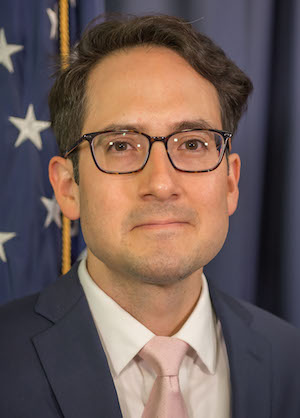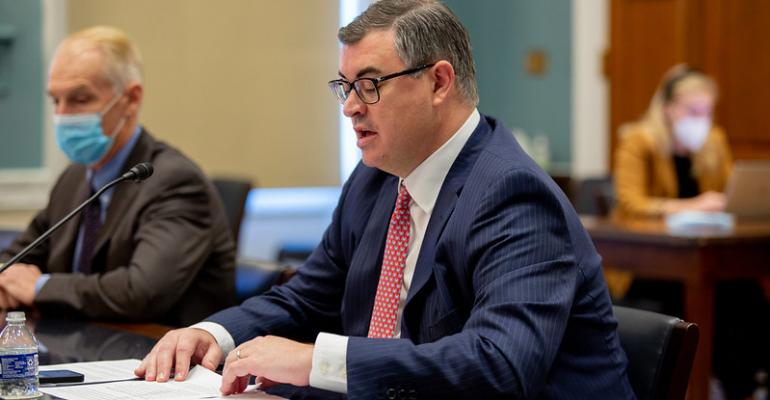The National Grocers Association (NGA) may be getting some high-level assistance in its more than 18-month push for federal lawmakers and regulators to crack down on so-called grocery retail “power buyers.”
NGA lauded comments yesterday by Federal Trade Commissioner Alvaro Bedoya, in an address in Minneapolis, that the FTC re-energize the Robinson-Patman Act to clamp down on dominant big-box, online and chain grocery retailers that exhibit anticompetitive behavior that puts independent grocers at a marked disadvantage in supply and pricing.
 “Certain laws that were clearly passed under what you could call a fairness mandate — laws like Robinson-Patman — directly spell out specific legal prohibitions. Congress’s intent in those laws is clear. We should enforce them.” — Alvaro Bedoya, FTC commissioner (Photo courtesy of FTC)
“Certain laws that were clearly passed under what you could call a fairness mandate — laws like Robinson-Patman — directly spell out specific legal prohibitions. Congress’s intent in those laws is clear. We should enforce them.” — Alvaro Bedoya, FTC commissioner (Photo courtesy of FTC)
At a press event in March 2021, NGA highlighted how small food retailers are being squeezed by big players such as Walmart, Amazon, Costco Wholesale, Target and Dollar General, among others, that use their scale to command more favorable supply terms, lower pricing, special product package sizes and first call on high-demand items. The disparity was especially pronounced during the COVID-19 pandemic, as independent grocers’ customers often encountered empty shelves and higher prices for essential products, whereas large competitors were able to procure sought-after items. NGA detailed the issue in a white paper, titled “Buyer Power and Economic Discrimination in the Grocery Aisle: Kitchen Table Issues for American Consumers.”
Current U.S. antitrust laws — including the Sherman Act (outlawing monopolies), Clayton Act (barring anticompetitive business practices) and the Robinson-Patman Act (prohibiting price discrimination by suppliers against retailers) — provide the tools to curb discriminatory practices by dominant retail chains, but antitrust agency and court enforcement has waned, NGA reported.
“Unfortunately, this is not a new reality faced by independent community grocers across the country, where the playing field on which they are operating is not level and dominant firms exercise their power to demand special treatment from suppliers without an economic justification. Independent grocers and the wholesalers that serve them provide critical competition on price, quality, service and convenience,” NGA President and CEO Greg Ferrara said in a statement. “A spotlight has been shone on these anticompetitive, harmful tactics, and we look forward to working with the FTC and other policymakers to restore a competitive, robust marketplace that benefits local economies, independent grocers and their shoppers alike.”
NGA has cited the Robinson-Patman Act, in particular, as a remedy to safeguard small businesses from price discrimination in the marketplace. Yet the FTC has not brought a case under the law in more than 20 years or an enforcement action against economic discrimination using the other antitrust laws.

NGA President and CEO Greg Ferrara said, ‘We look forward to working with the FTC and other policymakers to restore a competitive, robust marketplace that benefits local economies, independent grocers and their shoppers alike.’
That stands to change, according to the FTC chief.
“In 1936, Congress passed the Robinson-Patman Act, the law I talked about earlier that bans ‘unfair practices’ like ‘secret discounts’ and ‘secret rebates,’ available only to the large and powerful. When it passed that law, Congress went out of its way to ‘keep open the door of opportunity for the small-business man as well as large. For decades, Robinson-Patman was a mainstay of FTC enforcement,” Bedoya said in a speech at the Midwest Forum on Fair Markets, hosted by the Institute for Local Self-Reliance and the Open Markets Institute.
“Then, as [the idea of] efficiency gained ground in the mid-1980s, a view took hold among enforcers and then courts,” he explained. “First, that Robinson-Patman was an outlier among antitrust statutes because the Congress that passed it focused on harms to supposedly inefficient small businesses. Second, that the law raised consumer prices. Enforcement slowed to a trickle, and then stopped completely.”
Instead, Bedoya noted, there needs to be a return to fairness to promote market balance.
“People may not know what is efficient, but they know what’s fair,” he said, adding, “Congress and the courts have told us, directly and repeatedly, how to implement protections against unfairness. Certain laws that were clearly passed under what you could call a fairness mandate — laws like Robinson-Patman — directly spell out specific legal prohibitions. Congress’s intent in those laws is clear. We should enforce them.”
NGA represents more than 1,600 independent grocery retailers, which account for nearly 9,000 store fronts nationwide, including at least one in every congressional district.
“As the newest FTC commissioner, Mr. Bedoya has held meetings with NGA and its members to hear how unchecked power buyers directly impact local independent grocers and the communities they serve. We appreciate the work he has done to bring this important issue back to the forefront of policy discussions,” stated Chris Jones, senior vice president of government relations and counsel at NGA. “We’re pleased to see the bipartisan momentum this issue has received and hope it will lead to a course correction in how U.S. antitrust laws are enforced.”


